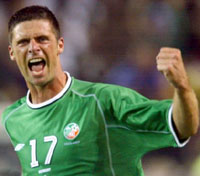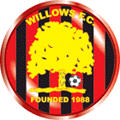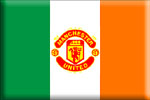Niall Quinn – Irish Football Great Niall Quinn Niall QuinnWearing the Green of Ireland Niall Quinn – IntroductionAs a young boy Niall Quinn never held any ambitions to be an great Irish soccer player. His first love was Gaelic games and particularly hurling. When he was 16 years of age he played for Dublin in the 1983 All-Ireland minor hurling final against Galway. Unfortunately for Niall Dublin lost that final. However his ability as a striker on the soccer pitch didn’t go unnoticed and after an unsuccessful trial with Fulham FC another London football club came knocking. Soccer giants Arsenal offered Quinn a trial. Playing for the Arsenal Under 18s team he scored a hat-trick of goals. Soon afterwards the signature of Niall Quinn appeared on an Arsenal professional contract. That was in October 1983 just after Quinn had turned 17 years of age. Niall Quinn the GunnerIt wasn’t until the 1985 – 1986 season that Quinn made his full team debut for Arsenal against Liverpool FC. He scored on his debut and also created a goal for striking partner Charlie Nicholas. For most of the next three or four years Quinn was largely a squad player making irregular appearances. During this time he picked up a League Cup winners medal in 1987 but had not made enough first team appearances to merit a medal when the Gunners won the League in 1989. Eventually Quinn got a sustained run in the first team however it became clear to him that his long term career lay elsewhere when manager George Graham signed striker Alan Smith. It was time to move. Niall Quinn the City SlickerNiall Quinn transferred to Manchester City in March 1990 for a fee of £800K. Perhaps it was because he had the confidence of his manager and perhaps because he was almost guaranteed to be first team regular his football blossomed. He had one of his most productive years of his soccer career in terms of goals in his first year with City. During the 1990-1991 season Quinn banged in 20 goals. This was quite some haul for a player who never considered himself an out-and-out striker. He always felt that his role was to be a provider. Successive seasons were not quite as prolific in terms of goals but he was a huge favourite with the Manchester City fans. Prior to the 1994 World Cup Finals – for which the Republic of Ireland had qualified – Quinn ruptured his cruciate ligament. Not only did this mean that he missed the World Cup Finals it also left a major hole in his City career which was to come to an end when he left the club for Sunderland in 1996. Niall Quinn – the MackemDespite the fact that Niall Quinn was to injury his other cruciate he went on to become a firm favourite with the North-East club. With outstanding support from his manager Quinn made a full recovery and play some of the best football of his club career with Sunderland. In particular he formed a lethal partnership with his striking partner Kevin Phillips. Quinn always liked to play alongside a smaller, mobile, forward who could latch on to Quinn’s flicks and lay offs. To the Sunderland fans and wider community Niall Quinn is a hero and not just for his exploits on the soccer pitch. In a time when everything about football seemed to revolve around money Quinn decided to donate the proceeds of his testimonial match equally to charities in Sunderland and Dublin. He retired from football in 2002. In 2003 he was awarded an honorary MBE for his contribution to football and to English charities. Niall Quinn was to return to Sunderland in 2006 bringing with him an investment consortium to rescue the club from potential relegation from the Championship. Within a year Sunderland were promoted to the Premiership. The Niall Quinn / Sunderland love affair continues. Niall Quinn – The Irish InternationalQuinn had a quite successful international soccer career including, for a while, being the record goal scorer for the Republic of Ireland. He was picked by Jack Charlton for his full international debut in 1986. It was against Iceland and he came on as a late substitute. At the time Charlton could call upon Frank Stapleton, Tony Cascarino and John Aldridge to play up front for Ireland. This limited the young strikers opportunities to play for his country in the early days. Nevertheless Quinn was an ever-present, except when injured, in Irish squads under Charlton. This provided a type of release valve for Quinn when he was very much on the fringe of the Arsenal first team set up. Niall Quinn’s international career spanned all of the major championships that Ireland qualified for over a decade and a half. He came on as a substitute in the 1-0 win over England in Stuttgart, Germany in the 1988 European Football Championship Finals. He also played in all of the matches at the World Cup Finals in Japan and Korea in 2002. In between he also played in the World Cup in Italy in 1990 but he missed out on the 1994 World Cup in the USA through injury. This injury denied Quinn the unique distinction of appearing in every major finals that Ireland ever qualified for. In the 1990 World Cup he famously scored the equaliser in a group match against the Dutch. That goal meant that Ireland qualified for the next round against Romania. Quinn scored many important goals for Ireland over the years including a sublime equaliser against England at Wembley in a European Championship qualifier in 1991. In October 2001 scored his 21st goal for the Republic of Ireland against Cyprus. This goal made him the all-time top goal scorer for Ireland surpassing the previous holder Frank Stapleton. Quinn held on to this title until Robbie Keane overtook him in 2004. Niall Quinn was truly a great Irish soccer player who won 92 international caps scoring 21 goals on the way. References :Niall Quinn: The Autobiography; Niall Quinn (2002); Headline Book Publishing
|
Irish Football Players – All Republic of Ireland FootballersJohn Aldridge – George Best – Packie Bonner – Liam Brady – Shay Brennan – Noel Cantwell – Johnny Carey – Gerry Daly – Mal Donaghy – Derek Dougan – Damien Duff – Tony Dunne – Eamon Dunphy – Johnny Giles |
|
Republic of Ireland Football Managers – Irish Manager’s Records Mick Meagan – Liam Tuohy – Sean Thomas – John Giles – Alan Kelly – Eoin Hand – Jack Charlton |






